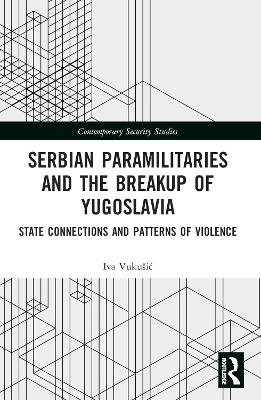
Serbian Paramilitaries and the Breakup of Yugoslavia
State Connections and Patterns of Violence
Seiten
2024
Routledge (Verlag)
978-1-032-04447-7 (ISBN)
Routledge (Verlag)
978-1-032-04447-7 (ISBN)
This is the first book to offer a comprehensive analysis of the emergence, nature, and function of Serbian paramilitary units during the violent breakup of Yugoslavia.
The book investigates the nature and functions of paramilitary units throughout the 1990s, and their ties to the state and President Slobodan Milošević. The work relies on the archives of the International Criminal Tribunal for the former Yugoslavia in The Hague, which conducted dozens of trials relating to paramilitary violence, and records from judicial proceedings in the region. It discusses how and why certain important paramilitary units emerged, how they functioned and transformed through the decade, what their relationships and entanglements were with the state, the Milošević regime, and organized crime. The study thus investigates the interrelated ideological, political, and social factors and processes, fueling paramilitary engagement, and assesses the impact of this engagement on victims of paramilitary violence and on the state and society for which the units purportedly fought. It argues that coordinated action by a number of state institutions gave rise to paramilitaries tasked with altering borders while maintaining plausible deniability for the sponsoring regime. The outsourcing of violence by the state to paramilitaries led to a significant weakening of the very state these units and their sponsors swore to protect. The book also analyzes differences between the units and how they attacked civilians, arguing that the different forms of violence stemmed not only from the function they fulfilled for the state but also the ways in which they were set up and operated. The final chapter brings the different strands of the argument together into a coherent whole, suggesting avenues for further research, in the former Yugoslavia and beyond.
This book will be of much interest to students of ethnic conflict and civil war, war crimes, Balkan politics, and International Relations in general.
The book investigates the nature and functions of paramilitary units throughout the 1990s, and their ties to the state and President Slobodan Milošević. The work relies on the archives of the International Criminal Tribunal for the former Yugoslavia in The Hague, which conducted dozens of trials relating to paramilitary violence, and records from judicial proceedings in the region. It discusses how and why certain important paramilitary units emerged, how they functioned and transformed through the decade, what their relationships and entanglements were with the state, the Milošević regime, and organized crime. The study thus investigates the interrelated ideological, political, and social factors and processes, fueling paramilitary engagement, and assesses the impact of this engagement on victims of paramilitary violence and on the state and society for which the units purportedly fought. It argues that coordinated action by a number of state institutions gave rise to paramilitaries tasked with altering borders while maintaining plausible deniability for the sponsoring regime. The outsourcing of violence by the state to paramilitaries led to a significant weakening of the very state these units and their sponsors swore to protect. The book also analyzes differences between the units and how they attacked civilians, arguing that the different forms of violence stemmed not only from the function they fulfilled for the state but also the ways in which they were set up and operated. The final chapter brings the different strands of the argument together into a coherent whole, suggesting avenues for further research, in the former Yugoslavia and beyond.
This book will be of much interest to students of ethnic conflict and civil war, war crimes, Balkan politics, and International Relations in general.
Iva Vukušić is an Assistant Professor in International History at Utrecht University in the Netherlands and a Visiting Research Fellow at the Department of War Studies, King’s College London.
1. Introduction 2. Emergence of Paramilitary Units 3. Functioning of Paramilitary Units 4. Transformation of Paramilitary Units 5. Paramilitary Violence in the Breakup of Yugoslavia 6. Conclusion
| Erscheinungsdatum | 05.09.2022 |
|---|---|
| Reihe/Serie | Contemporary Security Studies |
| Verlagsort | London |
| Sprache | englisch |
| Maße | 156 x 234 mm |
| Gewicht | 453 g |
| Themenwelt | Geisteswissenschaften ► Philosophie |
| Recht / Steuern ► EU / Internationales Recht | |
| Sozialwissenschaften ► Politik / Verwaltung ► Europäische / Internationale Politik | |
| ISBN-10 | 1-032-04447-0 / 1032044470 |
| ISBN-13 | 978-1-032-04447-7 / 9781032044477 |
| Zustand | Neuware |
| Informationen gemäß Produktsicherheitsverordnung (GPSR) | |
| Haben Sie eine Frage zum Produkt? |
Mehr entdecken
aus dem Bereich
aus dem Bereich
Studienbuch
Buch | Hardcover (2023)
De Gruyter Oldenbourg (Verlag)
44,95 €
Amerikas Strategie der Vorherrschaft und der Kampf um Eurasien
Buch | Softcover (2024)
NOMEN Verlag
20,00 €


